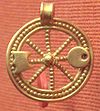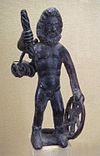- Moritasgus
-
- For the stick insect genus, see Moritasgus (insect).
Moritasgus is a Celtic epithet for a healing god found in four inscriptions at Alesia.[1] In two inscriptions, he is identified with the Greco-Roman god Apollo.[2] His consort was the goddess Damona.
Alesia was an oppidum of the Celtic Mandubii in present-day Burgundy. A dedication to the gods alludes to the presence of a shrine at the curative spring, where sick pilgrims could bathe in a sacred pool. The sanctuary itself, located near the eastern gate of the town just outside the city wall,[3] was impressive, with baths and a temple. In addition, there were porticoes, where the sick possibly slept, hoping for divine visions and cures.
Numerous votive objects[4] were dedicated to Moritasgus. These were models of the pilgrims and the afflicted parts of their bodies: these included limbs, internal organs, genitals, breasts, and eyes. Surgeons' tools have also been found, suggesting that the priests[5] also acted as surgeons.
The name Moritasgus, shared by a 1st-century BC ruler of the Senones,[6] has been analyzed variously. It probably means "Great Badger" or "Sea Badger." The European badger produced a secretion used in Gaulish medicaments, hence a possible connection with a healing god.[7]
Selected bibliography
- Dictionary of Celtic Myth and Legend. Miranda Green. Thames and Hudson Ltd. London. 1997.
References
- ^ Jacky Bénard et al., Les agglomérations antiques de Côte-d'Or (Annales Littéraires de l'Université de Besançon, 1994), p. 251 online.
- ^ CIL 13.11240 and 11241; Bernhard Maier, Dictionary of Celtic Religion and Culture (Alfred Kröner, 1994, 1997, translation Boydell & Brewer 1997), p. 198 online.
- ^ James Bromwich, The Roman Remains of Northern and Eastern France: A Guidebook (Routledge, 2003), pp. 49 and 133 online et passim.
- ^ See ex-voto and Milagro (votive) for analogous Christian practices.
- ^ The druids were the priesthood of the ancient Celts.
- ^ Julius Caesar, Commentarii de Bello Gallico 5.54.
- ^ Gaulish tasgos (also tascos or taxos), "badger," with mor either "sea" or "great" (= mar). See Xavier Delamarre, Dictionnaire de la langue gauloise (Éditions Errance, 2003), pp. 229, 292–293, and D. Ellis Evans, Gaulish personal names: a study of some Continental Celtic formations (University of Michigan Press, 1967), p. 103. For further discussion, see Tasgetius: Name and badger lore.
Celtic mythology series Ancient deities of Gaul, Britain and Gallaecia by region Supra-regional Alaunus • Alisanos • Andarta • Anextiomarus • Artio • Aveta • Belenus • Belisama • Borvo • Brigantia • Camulus • Cernunnos • Cicolluis • Cissonius • Condatis • Damona • Matrona • Dis Pater • Epona • Erecura • Esus • Genii Cucullati • Grannus • Ialonus Contrebis • Lenus • Litavis • Loucetios • Lugus • Maponos • Matres • Mogons • Nantosuelta • Ogmios • Rosmerta • Segomo • Sirona • Sucellus • Suleviae • Taranis • Toutatis • Virotutis • VisuciusBritannia Gallia Aquitania Gallia Belgica Abnoba • Ancamna • Arduinna • Arvernus • Icovellauna • Inciona • Intarabus • Iovantucarus • Ritona • Veraudunus • Vindonnus • Vosegus • XulsigiaeGallia Celtica Gallia Cisalpina Gallia Narbonensis Germania Inferior Gallaecia Categories:- Ancient Gaulish and British gods
Wikimedia Foundation. 2010.


